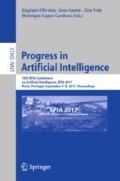Abstract
There are many open issues and challenges in the multi-agent reward-based learning field. Theoretical convergence guarantees are lost, and the complexity of the action-space is also exponential to the amount of agents calculating their optimal joint-action. Function approximators, such as deep neural networks, have successfully been used in single-agent environments with high dimensional state-spaces. We propose the Multi-agent Double Deep Q-Networks algorithm, an extension of Deep Q-Networks to the multi-agent paradigm. Two common techniques of multi-agent Q-learning are used to formally describe our proposal, and are tested in a Foraging Task and a Pursuit Game. We also demonstrate how they can generalize to similar tasks and to larger teams, due to the strength of deep-learning techniques, and their viability for transfer learning approaches. With only a small fraction of the initial task’s training, we adapt to longer tasks, and we accelerate the task completion by increasing the team size, thus empirically demonstrating a solution to the complexity issues of the multi-agent field.
References
Becker, R., Zilberstein, S., Lesser, V., Goldman, C.V.: Transition-independent decentralized markov decision processes. In: Proceedings of the Second International Joint Conference on Autonomous Agents and Multiagent Systems, AAMAS 2003, pp. 41–48. ACM, New York (2003)
Busoniu, L., Babuska, R., De Schutter, B.: A comprehensive survey of multiagent reinforcement learning. Trans. Syst. Man Cybern. Part C 38(2), 156–172 (2008)
Claus, C., Boutilier, C.: The dynamics of reinforcement learning in cooperative multiagent systems. In: Innovative Applications of Artificial Intelligence, IAAI 1998, pp. 746–752. American Association for Artificial Intelligence (1998)
Egorov, M.: Multi-agent deep reinforcement learning. University of Stanford, Department of Computer Science, Technical report (2016)
Foerster, J.N., Assael, Y.M., de Freitas, N., Whiteson, S.: Learning to communicate to solve riddles with deep distributed recurrent q-networks. CoRR abs/1602.02672 (2016)
Glorot, X., Bengio, Y.: Understanding the difficulty of training deep feedforward neural networks. In: AISTATS, vol. 9, pp. 249–256 (2010)
van Hasselt, H., Guez, A., Silver, D.: Deep reinforcement learning with double q-learning. CoRR abs/1509.06461 (2015)
Kapetanakis, S., Kudenko, D.: Reinforcement learning of coordination in cooperative multi-agent systems. In: Eighteenth National Conference on Artificial Intelligence, Menlo Park, CA, USA, pp. 326–331. American Association for Artificial Intelligence (2002)
Kingma, D.P., Ba, J.: Adam: a method for stochastic optimization. CoRR abs/1412.6980 (2014)
Lau, N., Reis, L.P.: FC Portugal - high-level coordination methodologies in soccer robotics. InTech Education and Publishing, Vienna, December 2007
Lauer, M., Riedmiller, M.: An algorithm for distributed reinforcement learning in cooperative multi-agent systems. In: Proceedings of the Seventeenth International Conference on Machine Learning, pp. 535–542. Morgan Kaufmann (2000)
Mnih, V., Kavukcuoglu, K., Silver, D., Graves, A., Antonoglou, I., Wierstra, D., Riedmiller, M.: Playing atari with deep reinforcement learning. CoRR abs/1312.5602 (2013)
Nair, R., Tambe, M., Yokoo, M., Pynadath, D., Marsella, S., Nair, R., Tambe, M.: Taming decentralized pomdps: towards efficient policy computation for multiagent settings. In: IJCAI, pp. 705–711 (2003)
Reis, L.P., Lau, N., Oliveira, E.C.: Situation based strategic positioning for coordinating a team of homogeneous agents. BRSDMAS 2000. LNCS, vol. 2103, pp. 175–197. Springer, Heidelberg (2001). doi:10.1007/3-540-44568-4_11
Stone, P.: Layered Learning in Multiagent Systems: A Winning Approach to Robotic Soccer. MIT Press, Cambridge (2000)
Stone, P., Veloso, M.: Multiagent systems: a survey from a machine learning perspective. Auton. Robot. 8(3), 345–383 (2000)
Tampuu, A., Matiisen, T., Kodelja, D., Kuzovkin, I., Korjus, K., Aru, J., Aru, J., Vicente, R.: Multiagent cooperation and competition with deep reinforcement learning. CoRR abs/1511.08779 (2015)
Taylor, M.E., Stone, P.: Transfer learning for reinforcement learning domains: a survey. J. Mach. Learn. Res. 10(1), 1633–1685 (2009)
Watkins, C.J., Dayan, P.: Q-learning. Mach. Learn. 8(3–4), 279–292 (1992)
Acknowledgements
The first author is supported by FCT (Portuguese Foundation for Science and Technology) under grant PD/BD/113963/2015. This research was partially supported by IEETA and LIACC. The work was also funded by project EuRoC, reference 608849 from call FP7-2013-NMP-ICT-FOF.
Author information
Authors and Affiliations
Corresponding author
Editor information
Editors and Affiliations
Rights and permissions
Copyright information
© 2017 Springer International Publishing AG
About this paper
Cite this paper
Simões, D., Lau, N., Reis, L.P. (2017). Multi-agent Double Deep Q-Networks. In: Oliveira, E., Gama, J., Vale, Z., Lopes Cardoso, H. (eds) Progress in Artificial Intelligence. EPIA 2017. Lecture Notes in Computer Science(), vol 10423. Springer, Cham. https://doi.org/10.1007/978-3-319-65340-2_11
Download citation
DOI: https://doi.org/10.1007/978-3-319-65340-2_11
Published:
Publisher Name: Springer, Cham
Print ISBN: 978-3-319-65339-6
Online ISBN: 978-3-319-65340-2
eBook Packages: Computer ScienceComputer Science (R0)

